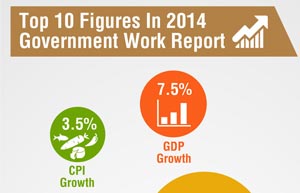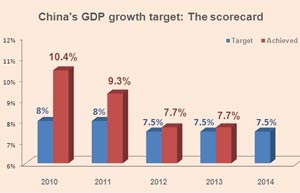No pain, no gain for China's reformers
Updated: 2014-03-31 07:50
By Ed Zhang (China Daily)
|
||||||||
Regardless of how strong China's central government is, the things that it can do are limited. It can grant free trade zone status to a city such as Shanghai. But it doesn't have the resources to support a few hundred cities all at once, especially when they are all making the same mistake.
|
 Premier calls for financial innovation |
|
 |
But even if the central government wants to give a boost to growth, it will have to be a different kind of stimulus package from the one that former Premier Wen Jiabao signed in late 2008, shortly after the Wall Street meltdown. Some key points:
It can't be as excessive as the 2008 stimulus package, to which the central government alone contributed 4 trillion yuan (close to $650 billion), and local governments contributed even more (mostly on credit, of course). A large stimulus plan would easily discredit the government's reform commitment in the eye of economists.
It can't be entirely directed to large State-owned enterprises, which will use the money to build unwieldy industrial monopolies that will only have to be broken down later. It cannot be allowed to stunt the growth of other types of businesses.
It can't be a purely monetary package, and it must integrate policy changes. A stimulus that works better for service industries, private-sector companies and small and medium-sized enterprises will contain more policy incentives, not just credit incentives.
It can't directly support local governments' large ongoing projects. To keep financing them, local governments will have to learn to be responsible bond issuers and communicate with investors, instead of the premier, in the market. Local governments grappling with too many ongoing or unfinished projects will have to learn how to privatize them through lawful channels.
It can't enable real estate development (meaning expensive housing projects) to dominate the economy again.
It can't compromise the health of the financial industry or lead to a surge in nonperforming loans. Nor should it trigger a quick rise in inflation.
Having set all these conditions, whatever stimulus might be introduced must be a strictly central government program, targeting select industries and locations.
It must facilitate, rather than to run counter to, the goals of reform.
In the meantime, most or all companies that still operate in the old industrial economy and pursue obsolete development strategies will face a long, painful path to reform.
|
 |
 |
- On reform, China needs to 'keep peddling': expert
- Premier urges capital market reforms
- The road to public finance reform
- China needs reforms for inclusive growth: Lagarde
- China should manage reform tradeoff, implementation
- China's reform fosters new growth impetus: vice premier
- Reforms give NGOs a level playing field

 World's tallest ferris wheel opens in Las Vegas
World's tallest ferris wheel opens in Las Vegas
 Did we get ya? Happy April Fools' Day!
Did we get ya? Happy April Fools' Day!
 Meet the crew of the drama of Green Snake
Meet the crew of the drama of Green Snake
 Students compete in Chinese competency
Students compete in Chinese competency
 Chinese, Belgian heads of state launch panda house
Chinese, Belgian heads of state launch panda house
 New British royal family photo released
New British royal family photo released
 Xi watches China-Germany youth football match in Berlin
Xi watches China-Germany youth football match in Berlin
 Participants run for color
Participants run for color
Most Viewed
Editor's Picks

|

|

|

|

|

|
Today's Top News
New iPhone 6 screens to enter production as early as May
We should join hands,
Xi tells EU
Ukraine sees troop pullback
Urgent hunt for black box
China calls for calm on Koreas
Chinese investors in US
Village elects new leadership in wake of scandals
Former senior military officer faces graft charge
US Weekly

|

|







